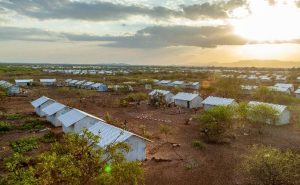World’s largest refugee camp in crisis
The world’s largest refugee camp at Kakuma in Kenya is reaching crisis point as thousands more refugees arrive after having fled conflicts in neighbouring countries.
Local officials say the continued inflow of asylum seekers in instability-affected Central African countries, including Sudan, Ethiopia and the Central African Republic, is posing an infrastructural challenge at the camp in Turkana County, in north-west Kenya.
They say they need time to plan for more arrival at the camp, which already houses 256,000 people.
Kenya’s Commissioner for Refugee Affairs John Mbaruku said the resettlement of more refugees at Kakuma has been halted due to a lack of infrastructure.
About 10,000 more asylum seekers have been received at the camp’s transit centre since January.
 While hundreds of the affected families have been transported for settlement at Kakuma, about 1,600 others are stranded at the transit centre where they are facing humanitarian challenges.
While hundreds of the affected families have been transported for settlement at Kakuma, about 1,600 others are stranded at the transit centre where they are facing humanitarian challenges.
So far, two deaths linked to starvation have been reported at the facility.
Mr Mbaruku said ongoing talks had begun between the Kenya and Uganda governments on the inflow of refugees from the resettlement camps in Eastern Uganda.
“Kenya wants to understand why this movement of refugees from Uganda and possible intervention to stop the inflow,” he said.
Meanwhile, a new report published by Amnesty International and Kenya’s National Gay and Lesbian Human Rights Commission says the camp is not a secure sanctuary for lesbian, gay, bisexual, transgender and intersex (LGBTI) refugees and asylum seekers.
This is due to the rising number of hate crimes and other human rights abuses that the LGBTI community experiences, which frequently go unreported to law enforcement.
“Because of its geographical advantages, Kenya attracts many people seeking refuge because of their sexual orientation,” the report says.
“However, similar to other Africa countries, has criminalised same-sex relationships and practices. This, combined with cultural and religious views, has created a harsh environment for LGBTI refugees in Kakuma,” it says.
The report details how LGBTI asylum seekers face prejudice due to their status as refugees or asylum seekers as well as their sexual orientation and gender identity.
It says this discrimination is reinforced by government employees and service providers throughout the registration and status determination. LGBTI refugees endure additional threats and harassment from law enforcement agencies, as well as limited prospects for local integration and resettlement.
The report also mentions the police’s continued passivity in cases involving LGBTI asylum seekers as targets of alleged hate crimes.
Among the numerous unresolved incidents, the report only recounts one example in which police officers investigated charges of sexual violence against an LGBTI refugee.
The two groups have called on the Kenyan government to protect the security of all LGBTI asylum seekers and refugees in the Kakuma.
They have also called on the government to take immediate action to address the hate crimes and other forms of discrimination committed against them and the wider LGBTI community.












